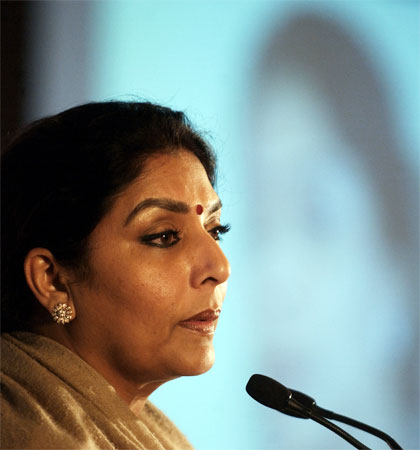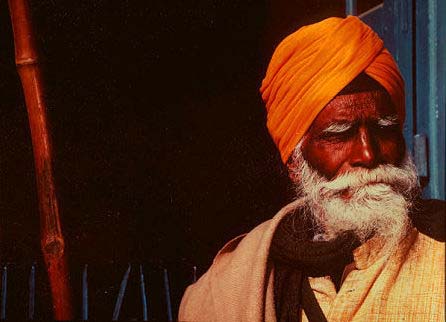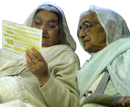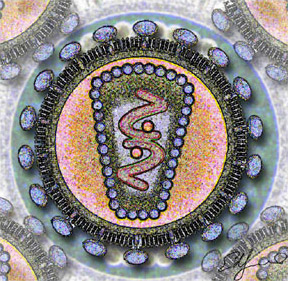
 India’s Women and Child Development Minister, Renukha Chowdury recently unveiled an expensive initiative to combat sex selection in India.
India’s Women and Child Development Minister, Renukha Chowdury recently unveiled an expensive initiative to combat sex selection in India.
India has launched a dramatic initiative to stop the widespread practice of poor families aborting female foetuses by offering cash incentives for them to give birth to the girls and then bring them up.
Families can expect to earn around £1,500 per girl under a government scheme announced this week.
In many parts of India, especially in remote and rural areas, male babies have long been the preferred child of expectant parents. Such is the perceived cost of marrying off a daughter and the contrasting anticipated benefits of having a male child that millions of daughters are often killed before they are born.
Unfortunately, the plan suffers from a giant blind spot. The economic incentives that are at the plan’s foundation assume that it is primarily families in poverty who abort female fetuses. The incentives offered ($3,000 over the course of 18 years) will only entice families who do not own multiple cars and take vacations to hill stations.
 A recent documentary on BBC Asian Network discusses the growing population of South Asians entering old age and the impact that is being felt on the middle generations who look after them. The documentary discusses the responsibilities second-generation Asians have to look after their elderly family members while balancing a career at the same time. The documentary illustrates the difficulties and sacrifices people make when looking after their parents/grandparents and the subsequent loss of dignity the elderly experience when suffering with illnesses and a loss of independence. I’m glad the documentary brought attention to an important issue that we have not readily addressed in our community.
A recent documentary on BBC Asian Network discusses the growing population of South Asians entering old age and the impact that is being felt on the middle generations who look after them. The documentary discusses the responsibilities second-generation Asians have to look after their elderly family members while balancing a career at the same time. The documentary illustrates the difficulties and sacrifices people make when looking after their parents/grandparents and the subsequent loss of dignity the elderly experience when suffering with illnesses and a loss of independence. I’m glad the documentary brought attention to an important issue that we have not readily addressed in our community.
 Having had recent personal experience with this issue, it is something I have thought about extensively. In our community, it is natural for children and grandchildren to take care of their parents or grandparents. It is an integral part of our culture and in fact, I think it creates a special bond between generations who are often pulled apart by language and culture. The documentary talks about the duty to look after our elders and the guilt individuals feel when they are faced with the decision to put their parents/grandparents in a nursing home. As one individual says,
Having had recent personal experience with this issue, it is something I have thought about extensively. In our community, it is natural for children and grandchildren to take care of their parents or grandparents. It is an integral part of our culture and in fact, I think it creates a special bond between generations who are often pulled apart by language and culture. The documentary talks about the duty to look after our elders and the guilt individuals feel when they are faced with the decision to put their parents/grandparents in a nursing home. As one individual says,
I never thought I’d be speaking to meals on blooming wheels for my father… and having to resort to the [government] to take care of him.
We’ve discussed AIDS in Punjab and its impact on women before. An impressive and inspiring update has since taken place.
place.
…a small group of HIV positive widows from rural Punjab has taken to a path that may prove to be a major initiative in making people living with HIV/AIDS self-reliant…
12 women in Anandpur Sahib have created a self-help group.
“We look at the formation of this self-help group as a rebirth. Our group wants to be financially self-reliant so that we can tell our relatives that we are no longer at the mercy or doles of relations for travel to a medical centres or to buy emergency drugs”, says Avtar Kaur, democratically elected president of the Bhai Ghania Self-Help Group.
The group is being assisted, interestingly, by Ambuja- a cement company responding to the alarming rates of infection of its truckers. The company has teamed up with the International Finance Corporation, a branch of the World Bank, to “proactively prevent and manage HIV/AIDS from affecting the Ambuja communities in eight manufacturing locations of the company across India.”
As you read this, you may want to press play to hear the accompanying music.
During my elementary years, my dhadhi would always give me a spoonful of a foul-substance that was called ‘sayth’ (health). For years, everyday, I would take a spoonful from the hands of my dhadhi without crying a word. I have no idea what I was taking or if it had any lasting effect, but as a kid I didn’t get sick that often and today I must admit I think I am healthy.
Many of us may have such memories, but no longer know the contents and usages of such desi remedies. Despite most of us being ‘mind-colonized’ by allopathic medicine, homeopathic medicine for preventative and minor ailment medication is being rediscovered by allopathic medical centers.
In 2005, researchers Davinder S. Sandhu and Michael Heinrich from the University of London’s School of Pharmacy published “The Use of Health Foods, Spices and other Botanicals in the Sikh Community in London” in Phytotherapy Research.
Like many communities bifurcated by both their religious understanding (Sikhi) and their ethnic/racial identities (for many of us, Punjabi), there are unique challenges to providing comprehensive mental health services to immigrant communities. Within the context of California, this is not only compounded by a lack of language access, but also by the vast isolation and transportation difficulties for those in the more rural areas of the state. And on top of all of that, the sheer diversity of issues that face Sikhs in the U.S. — from torture and domestic violence to struggling with learning disabilities, substance abuse, or depression — can exacerbate the experience for those who may already feel stigmatized.
A small but growing body of work examining how the religious and ethnic context of Sikh and Punjabi identity reframe service provision. Within the ABD, Punjabi, Sikh community in the Bay Area, a growing number of public health students are focusing their research specifically on mental health services, underreporting, and (the lack of access to) treatment.
Recently at The Langar Hall, we’ve discussed a variety of topics that seem to come back to the issue of mental health, both in the U.S.-diaspora and in Indian Punjab. There are certainly unique historical factors that contribute to what feels like a high incidence of mental health needs in the Punjabi community, but perhaps there are other factors at well. And while a significant number of ABD Punjabis become health professionals, how many have the language access needed to deliver health services and comfort newer immigrants? Are there new initiatives taking place, or are new resources being provided via already existing organizations? Some organizations (particularly DV organizations) have begun visiting at places of worship to do intake, but the need for translators is always a limiting factor. There’s a lot of energy bubbling around this, but will we see it concretely manifested soon? Do you see the need for outreach and services in your own local community? Or do you know of services and resources that are religiously-sensitive and culturally relevant?

